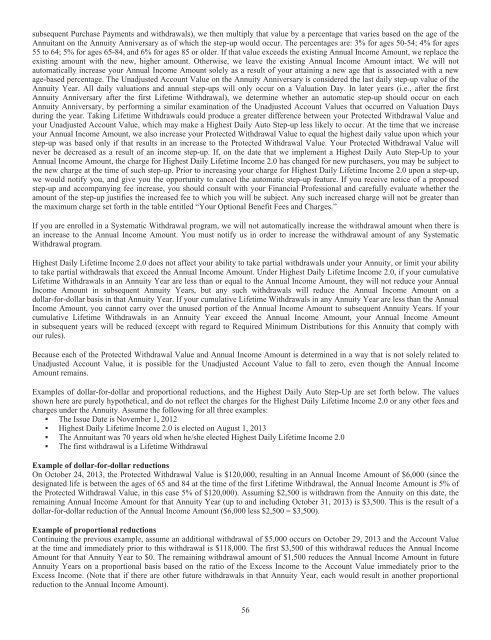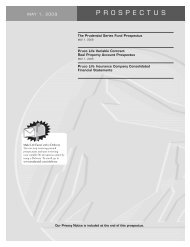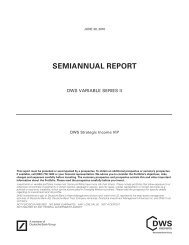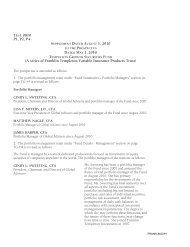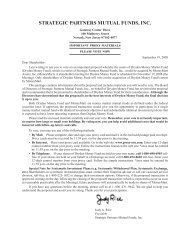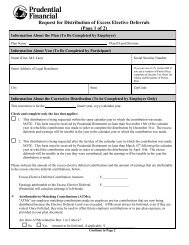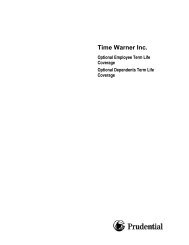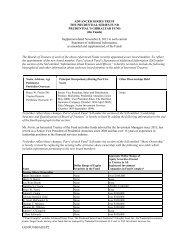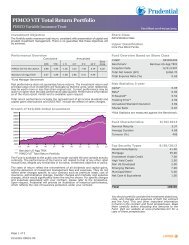Prudential Premier Retirement Variable Annuities
Prudential Premier Retirement Variable Annuities
Prudential Premier Retirement Variable Annuities
Create successful ePaper yourself
Turn your PDF publications into a flip-book with our unique Google optimized e-Paper software.
subsequent Purchase Payments and withdrawals), we then multiply that value by a percentage that varies based on the age of the<br />
Annuitant on the Annuity Anniversary as of which the step-up would occur. The percentages are: 3% for ages 50-54; 4% for ages<br />
55 to 64; 5% for ages 65-84, and 6% for ages 85 or older. If that value exceeds the existing Annual Income Amount, we replace the<br />
existing amount with the new, higher amount. Otherwise, we leave the existing Annual Income Amount intact. We will not<br />
automatically increase your Annual Income Amount solely as a result of your attaining a new age that is associated with a new<br />
age-based percentage. The Unadjusted Account Value on the Annuity Anniversary is considered the last daily step-up value of the<br />
Annuity Year. All daily valuations and annual step-ups will only occur on a Valuation Day. In later years (i.e., after the first<br />
Annuity Anniversary after the first Lifetime Withdrawal), we determine whether an automatic step-up should occur on each<br />
Annuity Anniversary, by performing a similar examination of the Unadjusted Account Values that occurred on Valuation Days<br />
during the year. Taking Lifetime Withdrawals could produce a greater difference between your Protected Withdrawal Value and<br />
your Unadjusted Account Value, which may make a Highest Daily Auto Step-up less likely to occur. At the time that we increase<br />
your Annual Income Amount, we also increase your Protected Withdrawal Value to equal the highest daily value upon which your<br />
step-up was based only if that results in an increase to the Protected Withdrawal Value. Your Protected Withdrawal Value will<br />
never be decreased as a result of an income step-up. If, on the date that we implement a Highest Daily Auto Step-Up to your<br />
Annual Income Amount, the charge for Highest Daily Lifetime Income 2.0 has changed for new purchasers, you may be subject to<br />
the new charge at the time of such step-up. Prior to increasing your charge for Highest Daily Lifetime Income 2.0 upon a step-up,<br />
we would notify you, and give you the opportunity to cancel the automatic step-up feature. If you receive notice of a proposed<br />
step-up and accompanying fee increase, you should consult with your Financial Professional and carefully evaluate whether the<br />
amount of the step-up justifies the increased fee to which you will be subject. Any such increased charge will not be greater than<br />
the maximum charge set forth in the table entitled “Your Optional Benefit Fees and Charges.”<br />
If you are enrolled in a Systematic Withdrawal program, we will not automatically increase the withdrawal amount when there is<br />
an increase to the Annual Income Amount. You must notify us in order to increase the withdrawal amount of any Systematic<br />
Withdrawal program.<br />
Highest Daily Lifetime Income 2.0 does not affect your ability to take partial withdrawals under your Annuity, or limit your ability<br />
to take partial withdrawals that exceed the Annual Income Amount. Under Highest Daily Lifetime Income 2.0, if your cumulative<br />
Lifetime Withdrawals in an Annuity Year are less than or equal to the Annual Income Amount, they will not reduce your Annual<br />
Income Amount in subsequent Annuity Years, but any such withdrawals will reduce the Annual Income Amount on a<br />
dollar-for-dollar basis in that Annuity Year. If your cumulative Lifetime Withdrawals in any Annuity Year are less than the Annual<br />
Income Amount, you cannot carry over the unused portion of the Annual Income Amount to subsequent Annuity Years. If your<br />
cumulative Lifetime Withdrawals in an Annuity Year exceed the Annual Income Amount, your Annual Income Amount<br />
in subsequent years will be reduced (except with regard to Required Minimum Distributions for this Annuity that comply with<br />
our rules).<br />
Because each of the Protected Withdrawal Value and Annual Income Amount is determined in a way that is not solely related to<br />
Unadjusted Account Value, it is possible for the Unadjusted Account Value to fall to zero, even though the Annual Income<br />
Amount remains.<br />
Examples of dollar-for-dollar and proportional reductions, and the Highest Daily Auto Step-Up are set forth below. The values<br />
shown here are purely hypothetical, and do not reflect the charges for the Highest Daily Lifetime Income 2.0 or any other fees and<br />
charges under the Annuity. Assume the following for all three examples:<br />
▪ The Issue Date is November 1, 2012<br />
▪ Highest Daily Lifetime Income 2.0 is elected on August 1, 2013<br />
▪ The Annuitant was 70 years old when he/she elected Highest Daily Lifetime Income 2.0<br />
▪ The first withdrawal is a Lifetime Withdrawal<br />
Example of dollar-for-dollar reductions<br />
On October 24, 2013, the Protected Withdrawal Value is $120,000, resulting in an Annual Income Amount of $6,000 (since the<br />
designated life is between the ages of 65 and 84 at the time of the first Lifetime Withdrawal, the Annual Income Amount is 5% of<br />
the Protected Withdrawal Value, in this case 5% of $120,000). Assuming $2,500 is withdrawn from the Annuity on this date, the<br />
remaining Annual Income Amount for that Annuity Year (up to and including October 31, 2013) is $3,500. This is the result of a<br />
dollar-for-dollar reduction of the Annual Income Amount ($6,000 less $2,500 = $3,500).<br />
Example of proportional reductions<br />
Continuing the previous example, assume an additional withdrawal of $5,000 occurs on October 29, 2013 and the Account Value<br />
at the time and immediately prior to this withdrawal is $118,000. The first $3,500 of this withdrawal reduces the Annual Income<br />
Amount for that Annuity Year to $0. The remaining withdrawal amount of $1,500 reduces the Annual Income Amount in future<br />
Annuity Years on a proportional basis based on the ratio of the Excess Income to the Account Value immediately prior to the<br />
Excess Income. (Note that if there are other future withdrawals in that Annuity Year, each would result in another proportional<br />
reduction to the Annual Income Amount).<br />
56


